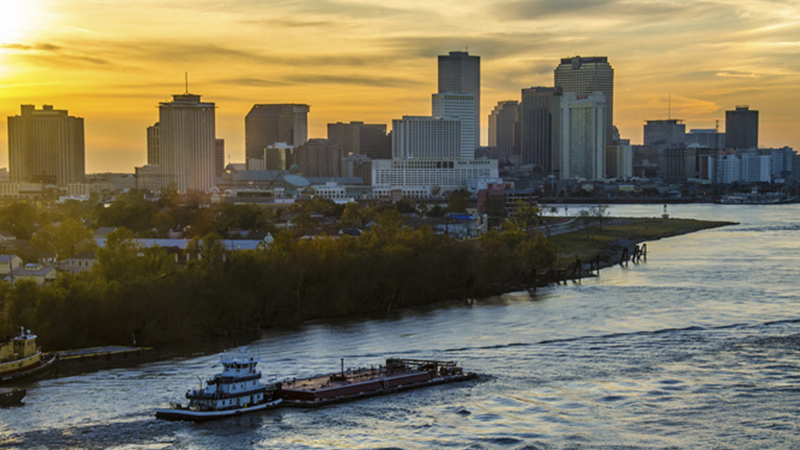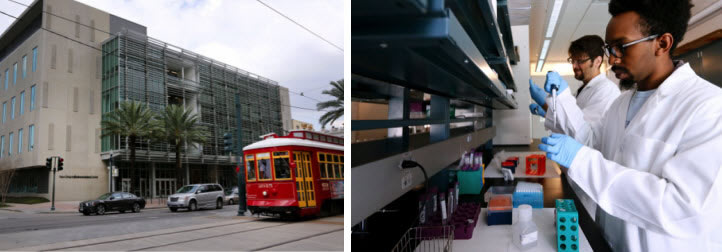Please update your browser.

Stories
New Orleans, Reinvented
By Scott Shalett, Head of Civic Engagement, JPMorgan Chase & Co.
Almost ten years ago, my family lost our home in Hurricane Katrina. As Chief of Staff to Lt. Governor Mitch Landrieu at the time, I experienced this loss with thousands of others along the Gulf Coast and across our state. Yet in those tragic and difficult days, weeks, months and years after the storm, we shared a common drive: to rebuild. Rebuild our homes, rebuild our cities and rebuild our economy.
Our challenge was to rebuild a city we loved with deep history and culture; while also imagining and constructing a new and more inclusive economy that worked better for current and future New Orleanians. Hurricane Katrina and the subsequent levee failures forced us to rebuild from the ground up. Five years later, the BP oil spill created new concerns about an economic structure that was not working. For decades, the New Orleans economy and population had been steadily declining. As the oil industry moved away and downsized, the city became more dependent on the tourism and hospitality industry.
The events of 2005 and 2010 catalyzed opportunity in New Orleans by compelling the entire community: political, businesses and nonprofits to look inward about what was working and what needed to change to become more inclusive, more diverse, more sustainable and more competitive. A decade later, the community has made real progress by coming together, making tough decisions and creating a stronger and more diverse foundation for the future. As a result, New Orleans is thriving. The city’s economy and its people are more resilient than ever and ready for a future that will show the world how to rebuild and renew!

Left: The New Orleans BioInnovation Center (NOBIC) - a nonprofit small business cluster that supports entrepreneurship and helps startups develop innovative medical devices, therapeutics, diagnostics and digital health platforms - is a prime example of ways the city is fostering new industries.
Right: TheBioInnovation Center offers entrepreneurs access to state-of-the-art biomedical equipment. Clients have raised more than $81 million in funding.
I recently spoke with two CEOs from New Orleans nonprofits about how the city has rebounded in the last ten years and is creating a more sustainable economy for future generations. Flozell Daniels, Jr. is President and CEO of the Foundation for Louisiana, a public foundation whose mission is to invest in people and practices that build stronger communities across the state. Melissa Ehlinger is the Interim President and CEO of the New Orleans Business Alliance, the official economic development organization for New Orleans, which is helping to grow jobs and wealth in the city through private and public partnerships. Below are excerpts from that conversation.
What economic challenges has New Orleans faced in recent years? What are some of the challenges being faced today?
Melissa Ehlinger: “Hurricane Katrina and the BP oil spill highlighted a lot of problems that were historically present in the way New Orleans’ economy was structured. We were heavily reliant on the oil and gas industry; so when that industry left, our economy shrunk and our middle class population started to leave. We also heard loud and clear from local businesses that the city needed to diversify its economy. For a really long time we had this two-legged stool of hospitality and oil and gas. While they are still very important industries for our city, we need to make sure we are not reliant on one or two sectors of the economy that are typically volatile.”
Flozell Daniels, Jr.: “The biggest issue facing Louisiana and New Orleans is not a natural or man-made disaster but our history of being less economically diverse than we need to be. When disasters hit our region and the U.S. economy and markets became unstable, our base industries of oil and gas saw drastic swings in prices and supply. In the last 10 years, we have been working hard at ways to build a stronger economic foundation by diversifying our economy and finding ways for more of our residents to participate in our growth. The hurricane and subsequent events exposed the need to be more resilient as a community and have a more resilient economy.”
How are local businesses, non-profits and policymakers working together to grow and diversify the local New Orleans economy?
Flozell Daniels, Jr.: “A modern economy in any city requires more coordination and flexibility to adapt to changes in the economic climate. That didn’t happen in New Orleans during our decline. After Hurricane Katrina, we learned quickly that better relationships across sectors and organizations produced better outcomes for the entire community. For example, as a nonprofit, Foundation for Louisiana began - and continues - to work closely with the private and public sectors to build real connections with the community and the folks whose lives we are trying to help improve. Through rigorous communication and coordination, we have been able to see major improvements and really strong economic indicators in the region. Entrepreneurship is up. Jobs are up. Unemployment is down, and now what we are trying to do is take advantage of a stronger economy so that we can continue to expand and grow.”
Melissa Ehlinger: “Partnerships were critical to starting and maintaining the process of diversifying our economy and strengthening our community. In 2012, we brought together over 200 business and civic leaders to take a hard look at our economy and have an open dialogue about where we wanted to go and what we needed to get there. This launched ProsperityNOLA, a five-year economic development strategy for the City of New Orleans. We quickly recognized that we have limited resources and need to prioritize and focus our efforts. That’s why the cluster approach works so well in New Orleans, we are building a more sustainable economy in the region through smart business clusters that help us expand and diversify key sectors of our economy by drawing in businesses and fostering new businesses locally.”
Why do you think business clusters work so well in nurturing economic growth, specifically in New Orleans?
Melissa Ehlinger: “A cluster-based approach makes sense for New Orleans because it doesn’t just look at the businesses that are currently local. Instead this approach looks at all of the support systems - education, capital, talent, etc. - that the businesses need to grow and brings them together to create a more diverse and expansive sector of our economy. Since Hurricane Katrina we have really grown a thriving entrepreneurial ecosystem, which helps business clusters grow and become sustainable. As this occurs, the entire community comes away with great support systems: better schools, job growth and generally more capital and willing investors in the city. This works in a post-Katrina New Orleans because the economy we are building is more representative and attuned to the needs of our diverse community.”
Flozell Daniels, Jr.: “The cluster approach gives us a chance to signal to partners both in the state and outside the state that we're focused and giving attention to places where we have natural strengths. New Orleans alone has seven universities, many of them research universities like Tulane University, Xavier University of Louisiana, and Louisiana State University, which are not only producing mission-critical research for future entrepreneurial ventures, but are also producing an amazing workforce of researchers, entrepreneurs, nonprofit workers and others. Business clusters produce this amazingly rich environment. In New Orleans we have seen the growth of several clusters including water management and coastal restoration, clusters in bio-innovation and health as well as creative and digital media.”
How is New Orleans positioned for a sustainable and inclusive economic future?
Flozell Daniels, Jr.: “We came together years ago and created this notion of New Orleans as a model city. It started as the model we wanted to build and is becoming a model for cities across the country that face some of the same challenges that we had to deal with all at once after Hurricane Katrina. We've been working to create solutions right here in New Orleans, powered by philanthropic partnerships and working with communities and across sectors. New Orleans, we believe, really is a model city in developing solutions and advancing answers that have national and global application. I can confidently say that sustainable industries have emerged, and our companies are now the world experts in health sciences, water management, and of course, disaster preparedness and disaster recovery.”
JPMorgan Chase & Co. is proud to support local innovators and entrepreneurs who are making the New Orleans economy resilient and sustainable for future generations, including New Orleans Business Alliance, Foundation for Louisiana and The New Orleans BioInnovation Center. As part of Small Business Forward, a five-year, $30 million initiative, JPMorgan Chase & Co. is working to support small businesses in communities like New Orleans by connecting them to critical resources to help them grow faster, create jobs and strengthen local economies.
